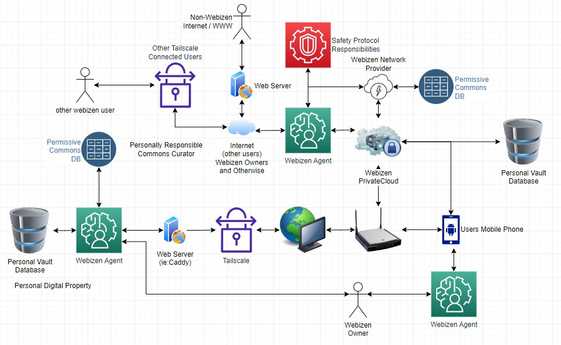Permissive Commons
Permissive Commons is thought of as a form of technology due to the requirement for a specification to be defined in-order for it to be made to work harmonously online.
Earlier writings about the concept have included, the article first published online around 2018: the-need-for-decentralised-open-linked-data which was followed by 2 others in 2019,
More work is being done to produce an implementation of these systems, namely via the Webizen works; although not necessarily exclusively. There are some complexities that are sought to be worked through, and is considered in-part to be a Web Civics project (although required for the Webizen Ecosystem to work); and in-turn, instrumental for HumanCentricAI.
Notes otherwise Below.
About PCT
Semantic Web Technologies are basically, part of the foundational technology components that are used for producing Artificial Intelligence systems. When producing content that uses semantic web technologies such as linked-data (rdf), this provides an array of abilities, however the content being authored is not only the content provided by the individual themselves; in a linked-data document, the terms used are provided meaning via ontologies; such as a document discussing flora or fauna, or statistics or law or a particular circumstance; all of these sorts of written works (as an example) relies both upon the writings of the author and in-turn external resources, that are generally intended to be considered from a perspective of the present-tense; as relates, to when that document was authored.
Yet the way HTTP / WWW works currently, it is difficult to maintain the Temporal Semantics or semantic resolution / comprehension, as a consequence of how various websites update or change their content or at times, change their names and no-longer exist. in other circumstances, the context of the time - is different to the context of a future time; so a link in a webpage describing something, may in-turn refer to an external source that later changes.
There are many examples of how these sorts of issues results in an inability to maintain knowledge artifacts via current-day web-sources (http / www). Whilst Archive.org and other sites like it do exist, they become a centralised archive rather than a part of how the internet is made to work - decentralising the responsibility to support these sorts of services, as a component that is as important as other components - such as DNS...
Historically also, there has been an 'open data' movement; however these resources are often not made available in a linked-data format; nor are they reliably available and/or verifiable, alongside an array of other qualities that the open-data movement has not seemingly achieved. So, in response to these issues, PermissiveCommons ecosystems concepts have grown overtime to respond to various issues that otherwise poorly impact FreedomOfThought and other values and semantics, of importance overall.
